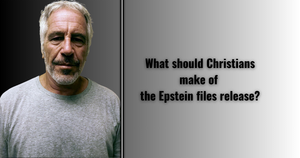With all that goes on in the Middle East, Israel is often in the news. The nation is a major political ally of the United States and many other countries across the world. However, the subject of Israel is a polarizing one in today's society. In light of their biblical status of being "God's chosen people," how should Christians view the modern version of Israel?
Seemingly every news broadcast in the Western world includes a segment or two on the Middle East. Often at the center of these stories is the nation of Israel and its ongoing conflict with the rest of the region.
Over the past two years or so, Israel's long-standing skirmish with Palestine has ratcheted up to new levels. With the war, other predominantly Islamic nations like Yemen, Lebanon, Syria, and, most recently, Iran have gotten involved in the fight. On the other side, the United States and several other allies–including a few in the Middle East–are directly or indirectly supporting Israel.
With so much conversation on a small nation halfway across the world from American Christians, political opinions vary on Israel. Among Christians, though, the percentage of Israel supporters is typically higher than among other groups.
But what should Christians think about Israel and everything surrounding it as a country?
Below, we will discuss some truths and observations about current events involving Israel. Typically, we would then look at how the political right and political left in America skew narratives, but that is not necessary in this article. Instead, we will look to see what the Bible teaches about Israel and its relationship with God and His people.
Some Facts about Current Events Surrounding Israel
- Israel has been engaged in off-and-on conflicts with many Middle Eastern nations for decades, ever since the re-establishment of the nation following World War II. Great Britain controlled Palestine as part of a post-World War I settlement, and in the immediate aftermath of WWII, the land was split between Palestine and Israel, creating both Muslim and Jewish borders. Centuries prior, various wars contributed to Israel being wiped off the map. The establishment of the "new" land meant that history had seen both Israel and Palestine have most or all of their sovereign land taken away without the consent of the people.
- The more intense fighting in recent years has centered on the fight between Israel and Palestine, especially in Gaza. Both nations feel entitled to most or all of the land that has shared its name with the two countries over the years.
- In October of 2023, the Palestinian terrorist group Hamas conducted a series of violent, coordinated attacks on southern Israel. Some estimates, including one from the official report from the United States government, believe that over 1200 civilians were killed in the attack (46 US citizens in Israel were killed, as well). Hostages were also taken, and other assaults were commonplace in the following days. This escalated the war in a major way.
- In what the US government calls the Israel-Hamas War, thousands of soldiers and civilians on either side have died. Countless billions of dollars of damage has been done, largely in Gaza. Multiple cease-fire agreements have either failed or been extremely temporary.
- Yemen, Lebanon, and Syria have been involved some, but Iran's recent interjection into things has been the most high-profile. In response to Iran firing missiles at Israel, the United States ordered strikes on Iranian nuclear facilities. Subsequently, a cease-fire was agreed to, and after some initial failings, it currently holds.
Some Observations about Current Events Surrounding Israel
- Neither Israel nor its Middle Eastern neighbors tend to operate in good faith in most instances when dealing with each other. Interest in hearing from the "other side" is rare, and compromise is even rarer.
- General opinions on the situation in the rest of the Western world are somewhat split. Though America is a major ally of Israel, many US citizens have different views on the nation and its current conflicts.
- Support amongst Muslim Americans leans heavily toward Palestine and the rest of the Middle East. The same can be said of a large number of liberal Americans, regardless of religious affiliation. Naturally, Jewish Americans greatly favor the Israeli side of things. For Christians, especially conservative Christians, support for Israel is overwhelming. Some base their support firmly on the geopolitical partnership between the US and the State of Israel. Others, as mentioned previously, base it upon the idea that the nation of Israel is "God's chosen people" and that Jews are "the people of God."
What the Bible Says
War, in any sense, is full of tragedy. Lives are lost, and regardless of political affiliation or one's opinions on Israel, war is something that results in the untimely death of believers and the unrepentant death of non-believers. In Ezekiel 18:23, the Lord rhetorically asks, "Have I any pleasure in the death of the wicked, declares the Lord God, and not rather that he should turn from his way and live?" In that sense, it is easy to see how war can grieve God. The rest of this section will not be about the war(s) but what the Bible says specifically about Israel.
Working through what God's Word says about Israel is complicated. The nation went through multiple phases and changes, both politically and spiritually, within Scripture's pages and has undergone even more in the days since. Today, opinions differ about Israel's place in the modern world. Let's talk about it.
Israel Was Considered the "People of God"
The word "was" is used here purposefully. (More on that in a minute)
Within His covenant with Abram (later, Abraham) in Genesis 12 and Genesis 15, the Lord first promises the nation of Israel. These people, the descendants of Abraham, according to God Himself, would receive the Promised Land, the area that now primarily makes up Israel and Palestinian territory. He says, "I will make of you a great nation, and I will bless you and make your name great, so that you will be a blessing" (Genesis 12:2). Then, in Genesis 15:13, the Lord tells Abram that he can "know for certain" that his descendants would escape a 400-year captivity to inhabit the Promised Land. That story is then told from the Book of Exodus through the beginning of Joshua as Abraham's descendants are delivered from their captivity in Egypt and brought to the Promised Land.
In Genesis 38:28, God renames Abraham's grandson Jacob, Israel. The name meant one who has "striven with God." The 12-tribe nation eventually established in the Promised Land was named Israel as a result. It is worth noting that Jacob/Israel came long before the establishment of the nation of Israel. The implication is clear: the people of God's Covenant are Israel.
Throughout the Old Testament, the Lord refers to Israel as His people. The Psalmist states in Psalm 135:4, "For the Lord has chosen Jacob for himself, Israel as His own possession." This was an intentional, sovereign act of the Lord. Deuteronomy 7:6 says about Israel, "For you are a people holy to the Lord your God. The Lord your God has chosen you to be a people for His treasured possession, out of all the peoples who are on the face of the earth." The word "holy" here can be translated to mean "set apart," further emphasizing God's specific choosing of Israel.
That choice was not one based on Israel's goodness or any future righteousness. Instead, it was done on the merit of God's own perfection and His desire that the whole Earth knows its Creator. Israel's job–one they often failed–was to glorify God by reaching the nations with the Truth. The Lord specifically chose His people for this purpose. He says in Exodus 19:5-6, immediately following Israel's exodus from Egypt, "'Now, therefore, if you will indeed obey my voice and keep my covenant, you shall be my treasured possession among all peoples, for all the earth is mine; and you shall be to me a kingdom of priests and a holy nation.'"
The Old Testament provides other hints of Israel being more of a personal term, not a political one.
The Lord judged Israel for the sin of the people on multiple occasions. The country was divided and then completely taken over by enemy nations more than once, and the people were taken into exile. Eventually, the country's political sovereignty was removed from existence. If the nation itself were the primary element of God's covenant, He would have sustained it. Instead, He sustained the people.
While it is undeniable that the Lord chose the nation of Israel in the Old Testament, it was God's election of a promised people, not just a Promised Land or a promised genealogy. He made a covenant with them. But ever since the decision to free Barabbas and crucify Jesus in Matthew 27:25 ("And all the people answered, 'His blood be on us and on our children!'"), those people have unquestioningly broken their covenant with God and forfeited all the inheritance they were promised from the Father.
The Church Is Israel
In the New Testament, the use of the name "Israel" continues to mean the "people of God," but it is much clearer that it is not meant in a geopolitical way.
The apostle Paul explains in Romans 9:6-8 when discussing whom the Lord has saved, "But it is not as though the Word of God has failed. For not all who are descended from Israel belong to Israel, and not all are children of Abraham because they are his offspring, but 'Through Isaac shall your offspring be named.' This means that it is not the children of the flesh who are the children of God, but the children of the promise are counted as offspring."
Within the observation that Israel is a people, not a country, it is important to notice that the label is reserved only for those who are "the children of the promise" and not "the children of the flesh." The promise of God through the gospel is that–through Christ and based only upon His own goodness–He will deliver His people from the punishment they deserve for their sin and, instead, will bring them into eternal fellowship with Him.
Just as the children of believers are not guaranteed the promise of eternal life in Heaven just because their parents are Christians, the children (or descendants) of Israel are not promised to be part of the true Israel. Salvation is not passed on genetically or within physical borders.
Instead, redemption from sin and restoration to God come only through faith in the completed work of Christ Jesus. Both the Old Testament (Isaiah 43:11- "I, I am the Lord, and besides Me, there is no savior.") and the New Testament (Acts 4:13- "And there is salvation in no one else, for there is no other name under Heaven given among men by which we must be saved.”) make this point clear.
As such, it makes sense that Paul would explain that neither circumcision (the mark of the Jews) nor uncircumcision (evidence of being a Gentile) makes a person a part of true Israel. He states in Galatians 6:15-16, "For neither circumcision counts for anything, nor uncircumcision, but a new creation. And as for all who walk by this rule, peace and mercy be upon them, and upon the Israel of God."
Paul also writes boldly in 2 Corinthians 6 and 2 Corinthians 7 about this subject. Quoting Old Testament passages from Exodus and Ezekiel that are explicitly about the Lord's relationship with Israel, Paul attributes words from God like "my dwelling" (2 Corinthians 6:16, Ezekiel 37:27), "my people" (2 Corinthians 6:16, Exodus 6:7), and "I will be a Father to you" (2 Corinthians 6:18, Exodus 4:22) to believers, specifically including the Gentile believers in the Church of Corinth by saying in 2 Corinthians 7:1 that "these promises" apply to his audience.
It should also be mentioned that merely claiming to be a Christian holds no salvific significance, either. Jesus says in Matthew 7:21 during the Sermon on the Mount, "Not everyone who says to me, ‘Lord, Lord,’ will enter the kingdom of heaven." Only true conversion makes one a part of true Israel.
The Nation of Israel Is Not the Church and, Therefore, Not Israel
As we have established, biblical Israel is the Church. Political Israel, the nation located in the Middle East, is not.
In fact, based upon demographic statistics from Israel, only 1.9% of the nation should be considered "God's people." That is the number of Israeli citizens who claim to be Christians. 73.8% of the population is Jewish, 18% is Muslim, and 1.6% identify as Druze. The rest of the population are "other," "non-religious," or "non-practicing Jewish." That percentage of Christ-proclaiming individuals in Israel is comparable to (or, in many instances, even less than) predominantly Muslim Middle Eastern nations. In total, 98.1% of the nation denies and rejects the Messiah.
The prophet Isaiah prophesied in Isaiah 10:22 that "though Your people Israel be as the sand of the sea, only a remnant will return" from exile. The exile was a clear picture of salvation, and just as the Lord only saved a remnant of Israel from exile, He has only saved a remnant of Israel from their sin.
In a 2019 article on The Gospel Coalition entitled "Theological Primer: Pactum Salutis", Pastor Kevin DeYoung called God's covenant of redemption with His people one that is between the Lord and "a people chosen in Christ." DeYoung's correct assertion stems from Paul's words in Ephesians 1:4 when he writes, "He chose us in Him before the foundation of the world." In a way that demonstrates God's transcendence of time, all of God's people, for all time, were saved by the work of Christ. Those saved by Jesus are the "remnant" referred to in Isaiah 10 and other passages as "Israel."
Considering the modern nation's extremely low percentage of individuals belonging to this remnant, the nation of Israel is not the same Israel. Though some might try to make the claim that Christians and Jews worship the same God, this is not so. Jewish people fundamentally deny Jesus as the Son of God and as the Messiah, completely missing the most important element of a relationship with the Lord. Salvation–and, therefore, true fellowship with God–is only possible because of the Messiah sacrificed Himself on behalf of His people. Denying that reality is a forfeiting of fellowship with God.
Some Christians called "Dispensationalists," believe that the nation of Israel and Jewish people have a distinct and separate spot in God's redemptive plan. They do not believe that Jews are saved. They do believe that, separate from the word Israel used to describe the Church in the New Testament, passages like Hosea 1 refer to Israel's rebellion and future redemption as a nation. However, this theological framework did not have much of a following until the late-1800s.
Do Christians Have Obligations to Israel and the Jewish People?
Thanks in part to dispensational theology, there is a relatively-commonly held view among Christians that the nation of Israel is still God's chosen people. However, according to the Word of God, the Jewish people have forsaken their covenant with the Lord and have no place in His kingdom. They rejected Christ at His first coming (Prophesied in Psalm 118:22, fulfilled in Matthew 21:42, Mark 12:10, and Luke 20:17, and explained in Acts 4:11) and continue to reject Him today. Paul explains in Romans 11:7, "Israel failed to obtain what it was seeking. The elect obtained it, but the rest were hardened." Some who were born Jewish have responded to the call of the gospel of Christ with faithful acceptance (we call people like this today "Messianic Jews" or "Jewish Christians), but most have not. Any benefits of being a nation filled with people who are considered the "people of God" have been lost.
In one sense, Christians absolutely have obligations to Israel.
Believers have obligations to non-believers, chiefly, to demonstrate God's love through Christ-centered living and gospel-proclaiming conversations. Praying for salvation, offering support to individuals when opportunity arises, and intentionally teaching the Truth are also required.
Believers also have obligations to Messianic Jews and Jewish Christians who have repented and been reconciled to Christ. The same ways in which Christians interact with non-believers (being a Christ-honoring example, preaching the gospel and teaching the Truth, supporting and meeting needs, etc.) apply here. However, believers also are called to gather with others in the Church, encourage each other to good works, and pursue holiness together.
However, when it comes to the apostate nation itself, none of this applies. Simply put, Christians have no God-given obligations to the State of Israel outside of the general commands to pray for and have compassion for others.
Final Thoughts
It is fine for a Christian to support Israel politically. However, that support should not be based upon a belief that the nation remains a modern version of God's holy, set-apart people from the Old Testament. It also should not be based upon a person turning a blind eye to Israel's own role in the conflicts in the Middle East. While there are many good arguments for why Israel is less in the wrong than many of their opponents, the nation is not without fault.
Israel, as a nation, is a people who have turned away from God. Believers should pray for their repentance, just as they pray for the repentance of all other non-believers.




